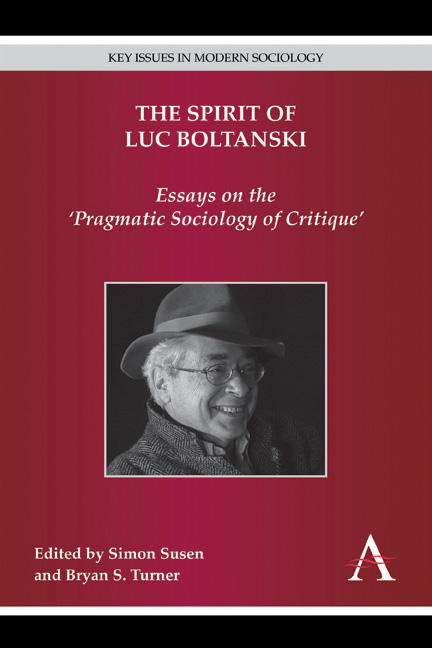Book contents
- Frontmatter
- CONTENTS
- List of Contributors
- Preface
- Part I Introductory Remarks
- Part II Luc Boltanski and (Post-) Classical Sociology
- Part III Luc Boltanski and Pragmatism
- Part IV Luc Boltanski and Critique
- Part V Luc Boltanski and Critical Sociology
- Part VI Luc Boltanski and Political Sociology
- Part VII Luc Boltanski and Contemporary Issues
- 18 Arranging the Irreversible: The Female Condition and Contradiction
- 19 Luc Boltanski and the Gift: Beyond Love, beyond Suspicion…?
- 20 The World of Worth in the Transhuman Condition: Prolegomena to a Proactionary Sociology
- 21 Luc Boltanski and the Problem of Time: Notes towards a Pragmatic Sociology of the Future
- Part VIII Luc Boltanski in Conversation
- Part IX Luc Boltanski and His Critics
- Index of Names
- Index of Subjects
19 - Luc Boltanski and the Gift: Beyond Love, beyond Suspicion…?
from Part VII - Luc Boltanski and Contemporary Issues
Published online by Cambridge University Press: 05 December 2014
- Frontmatter
- CONTENTS
- List of Contributors
- Preface
- Part I Introductory Remarks
- Part II Luc Boltanski and (Post-) Classical Sociology
- Part III Luc Boltanski and Pragmatism
- Part IV Luc Boltanski and Critique
- Part V Luc Boltanski and Critical Sociology
- Part VI Luc Boltanski and Political Sociology
- Part VII Luc Boltanski and Contemporary Issues
- 18 Arranging the Irreversible: The Female Condition and Contradiction
- 19 Luc Boltanski and the Gift: Beyond Love, beyond Suspicion…?
- 20 The World of Worth in the Transhuman Condition: Prolegomena to a Proactionary Sociology
- 21 Luc Boltanski and the Problem of Time: Notes towards a Pragmatic Sociology of the Future
- Part VIII Luc Boltanski in Conversation
- Part IX Luc Boltanski and His Critics
- Index of Names
- Index of Subjects
Summary
This chapter revisits Luc Boltanski's writings in terms of their implications for sociological research on the gift. More specifically, I wish to argue that the potential relevance of Boltanski's ‘pragmatic sociology’ – or, as it is also called, ‘sociology of critical capacities’ – has remained largely untapped in that regard.
The first section elucidates Boltanski's understanding of the gift on the basis of his writings on this topic. Concentrated in Love and Justice as Competences (Boltanski, 2012 [1990]), these rather brief statements mainly discuss the gift from the point of view of his conceptions of ‘competences’ and ‘regimes of social action’, as well as in relation to notions such as philia and agapè. Yet, neither philia nor agapè appear fully to account for the intrinsic paradoxes and tensions which Boltanski himself strongly reasserts as irreducible and crucial components of any adequate interpretation of the gift. The second section suggests that we may reach for a richer and more complex approach to the gift by drawing on Boltanski's ideas on ‘economies of worth’ and ‘regimes of worth and justification’, as chiefly elaborated in his collaborative publications with Laurent Thévenot (Boltanski and Thévenot, 2006 [1991], 1999). In such perspective, I submit, the gift – and, more precisely, valorized dimensions and configurations of giving – may be viewed not only as a major source of criticism and justification, but also, and no less significantly, as itself disputed and in need of justification.
Between Philia and Agapè: The Gift in Love and Justice as Competences
To begin with, it is worth noting that we know little about Boltanski's understanding of the gift, as the topic did not draw much attention on his part and remains marginal to his oeuvre as a whole. True enough, we find significant pages devoted to the gift in L'amour et la justice comme compétences (1990), which has appeared in English translation only very recently (Boltanski, 2012 [1990]: 138–144).
- Type
- Chapter
- Information
- The Spirit of Luc BoltanskiEssays on the 'Pragmatic Sociology of Critique', pp. 485 - 500Publisher: Anthem PressPrint publication year: 2014

